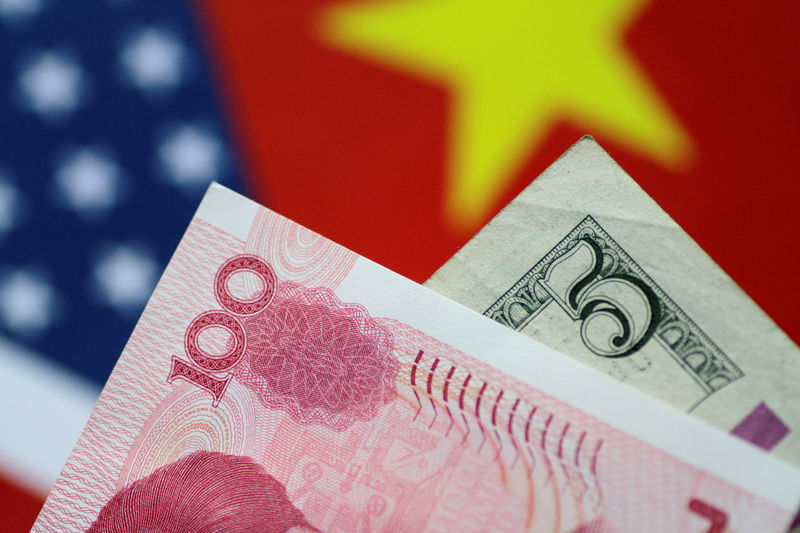By Winni Zhou and John Ruwitch
SHANGHAI (Reuters) - China has given those who bet against the yuan a bloody nose this year thanks to policy moves and intervention by the authorities. And yet, many traders and investors are still tipping the Chinese currency to decline against the U.S. dollar in the next year.
They argue that after a Communist Party leadership meeting in the fall, which is expected to solidify President Xi Jinping's grip on power, there will be room for the yuan to weaken. The Chinese government is determined to keep the financial system and the wider economy stable ahead of the gathering, which is held once every five years.
Even after three consecutive months of strengthening against the U.S. dollar, the first such positive run since 2014, many market participants are unconvinced by the gains.
David Qu, markets economist at ANZ Bank in Shanghai, said he doesn't believe that even with its recent strength the yuan's broad downward trend of recent years has been fundamentally reversed. "I don't think the renminbi is back on an appreciation path," he said, using the other name for the currency.
The People's Bank of China (PBOC), the nation's central bank, did not provide answers to faxed questions about the yuan's trajectory.
A Reuters poll of foreign exchange analysts published on August 3 found the yuan is forecast to weaken to 6.85 per dollar in six months and to 6.9 per dollar in a year. It settled at 6.6715 per dollar at the late night close on Monday.
The yuan slumped around 6.5 percent against the surging dollar last year, its largest decline since China unified official and market exchange rates in 1994. The global dollar index (DXY), which measures the dollar against a basket of major currencies, rose 3.6 percent in 2016.
This year, the yuan has gained around 4 percent as the greenback has slumped, but analysts say it should be up even more given that the dollar is down about 9 percent against other major currencies.
Companies wary of foreign exchange risks are keeping the yuan's gains in check.
"Half of our corporate clients who are purchasing dollars at current levels are still betting on a decline in the yuan in the belief that the rebound in the yuan has been a result of the weakness in the dollar and central bank intervention," said a forex trader at a regional bank in Shanghai.
Against other currencies, the yuan's value on a trade-weighted basis has actually fallen more than 1 percent this year, indicating it is actually weaker than the dollar exchange rate suggests. GOOD VIBES Tighter controls on capital outflows have been a big reason for yuan strength this year, along with dollar weakness and signs that the Chinese economy is improving, said Wang Tao, chief economist at UBS in Hong Kong.
"Some fundamental drivers of capital outflows remain - there is still strong demand among households and corporates to diversify their wealth into FX and overseas assets, while concerns about domestic asset bubbles and high leverage also remain high," Wang said.
Much of the money changed into dollars in China will actually stay in Chinese bank accounts, rather than circumventing capital export controls, but it sill serves as a hedge, experts say. Another sign that the market still wants dollars: the daily local closing price has been persistently weaker than the same day's benchmark fixing set by the PBOC prior to the market opening.
This has been the case even after the May introduction of a mysterious "counter-cyclical factor" into the official midpoint formula, with this X factor designed to reduce price swings and stabilise market expectations. In 44 out of 53 trading sessions between June 1 and August 14, the yuan was weaker than the midpoint at the 4:30 p.m. close.
Shan Kun, head of local-markets strategy at BNP Paribas (PA:BNPP) in Shanghai, said impetus for the yuan to retreat could grow.
"We have concerns that companies and financial institutions could decide that the yuan has become too strong in a short period of time and resume expansion of their holdings of dollar-denominated assets, and increase their enthusiasm for dollar buying," Shan said.
Foreign currency deposits held by households and companies have been rising steadily this year. The volume stood at $793.1 billion at the end of June, up 20.9 percent from a year earlier, official data from the central bank showed.
Derivatives and other gauges also suggest weakness ahead.
One-year dollar/yuan non-deliverable forwards
One-year risk reversals for the dollar against the yuan onshore

"The Chinese yuan would be still vulnerable to any upward correction in the U.S. dollar. If there is a potential rebound in the dollar, the impact on the yuan would be relatively huge," said Ken Cheung, senior Asian FX strategist at Mizuho Bank in Hong Kong.